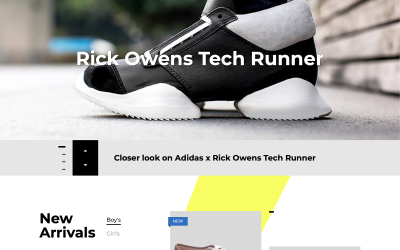Leading Patterns in Shoes Ecommerce for 2024: What You Need to Know
As we approach 2024, the landscape of footwear eCommerce is positioned for significant makeover, driven by ingenious patterns that guarantee to reshape consumer communications and acquiring actions. Trick advancements such as AI personalization, sustainability initiatives, and the rise of social business are established to redefine exactly how brand names connect with their target audiences.
Rise of AI Customization
The surge of AI customization in the shoes eCommerce industry is reshaping the way customers involve with brands. As sellers leverage advanced formulas and equipment understanding, they can currently customize the shopping experience to individual choices, boosting client fulfillment and loyalty. Through information evaluation, AI systems identify patterns in consumer actions, enabling brand names to use tailored item suggestions, promotions, and content.
As an example, vibrant item display screens change in real-time based on customer interaction, ensuring that consumers are provided with styles that reverberate with their preferences. This level of customization not just improves the purchasing experience yet likewise drives conversion rates, as customers are most likely to acquire products that align with their choices.
Furthermore, AI-driven chatbots provide individualized support, leading customers via the purchasing process and resolving queries in a timely fashion. This improved interaction fosters a much deeper connection in between brand names and consumers. As eCommerce continues to advance, the combination of AI personalization will certainly be essential in differentiating successful shoe sellers from their competitors, permitting them to create unique, interesting experiences that reverberate with the contemporary consumer. Accepting this trend is crucial for brands intending to flourish in the affordable landscape of 2024 and beyond.

Sustainability in Footwear
Highlighting sustainability in footwear has come to be an essential emphasis for brands as consumers significantly prioritize environment-friendly techniques. The footwear market is reacting by adopting sustainable products, ethical production techniques, and clear supply chains. Brands are now making use of recycled materials, such as plastic and rubber, to create long lasting and fashionable shoes. This shift not just reduces waste however also interest environmentally mindful customers.
Additionally, business are applying ingenious manufacturing techniques that minimize carbon impacts. 3D printing and automated production procedures minimize material waste and energy usage. Several brand names are dedicating to honest labor practices, ensuring reasonable incomes and risk-free working conditions for their employees, which reverberates highly with today's socially conscious consumers.
To boost sustainability initiatives, brands are also concentrating on the concept of circularity. This consists of take-back programs that urge clients to return old shoes for reusing or reconditioning, consequently prolonging product life and decreasing landfill waste. As the demand for lasting footwear remains to climb, firms that focus on green techniques will likely obtain an affordable edge in the industry, promoting brand loyalty and bring in brand-new clients dedicated to sustainability.
Growth of Social Business
Taking advantage of the surge of social networks platforms, brand names are increasingly incorporating social commerce right into their sales methods, acknowledging its potential to engage customers directly. This pattern has actually changed how consumers find and acquire footwear, with platforms like Instagram, TikTok, and Facebook advancing right into essential sales networks.
Brand names are leveraging shoppable blog posts, live streaming events, and influencer partnerships to produce immersive purchasing experiences that reverberate with their target audience. By utilizing visually attractive material and genuine narration, footwear brand names can effectively showcase their products and foster a sense of neighborhood amongst customers.
In addition, the use of user-generated content has become important in developing depend on and credibility. Consumers are more probable to purchase shoes when they see genuine individuals making use of and supporting the items. This organic form of marketing not only enhances brand commitment yet additionally drives conversions.
As the landscape remains to progress, shoe brands should remain agile, adapting to the most recent social commerce features while evaluating consumer behavior to enhance their techniques. By embracing this development, brand names can catch the interest of a wider audience, inevitably boosting and driving sales client engagement in the affordable shopping market.
Online Try-Ons and AR
Transforming the on-line purchasing experience, online try-ons and augmented fact (AR) innovations are becoming essential devices for shoe brands in 2024. These technologies permit consumers to envision exactly how shoes will certainly fit and look before purchasing, attending to one of one of the most significant discomfort points in online shopping: unpredictability about fit and design.
By leveraging AR, customers can use their smartphones or gadgets to see a reasonable overlay of footwear on their feet. This immersive experience not only improves engagement however also substantially reduces return rates, as customers are much more certain in their selections. With the growing refinement of AR technology, shoe brand names can create individualized experiences, allowing individuals to tailor shades, patterns, and styles in genuine time.
Furthermore, virtual try-ons are being incorporated right into social media platforms, making it easier for consumers to share their footwear selections with buddies and look for point of views. As consumers significantly expect personalized and interactive buying experiences, footwear brand names that adopt online try-on technology will obtain an one-upmanship. Inevitably, the integration of AR in ecommerce is not just a pattern; it is becoming a critical component of the consumer trip in click here for more the shoes market.
Subscription Designs and Solutions

These membership services commonly include tailored tests that assess individual style preferences, sizes, and needs, ensuring that consumers receive options that resonate with their preferences. Additionally, many brand names offer adaptable terms, permitting consumers to stop or terminate registrations conveniently, additional improving client contentment.
In addition, registration versions can assist minimize the decision-making problem connected with buying shoes, as you can check here consumers are presented with a selection that aligns with their choices. This technique not just promotes brand commitment however additionally motivates repeat purchases, as customers are more most likely to involve with brands that provide convenience and tailored solution.
As ecommerce remains to develop, the integration of registration solutions in shoe retail stands apart as a tactical relocation. It effectively fulfills the needs of contemporary consumers while driving continual income growth for brand names in a competitive industry.
Verdict
The progressing landscape of shoe eCommerce in 2024 underscores the value of AI customization, sustainability initiatives, and social commerce as crucial patterns forming consumer experiences. As brand names progressively take on sophisticated technologies such as digital try-ons and subscription versions, the emphasis on boosting customer involvement ends up being extremely important. These advancements not just reflect transforming consumer choices but additionally suggest a more more comprehensive shift in the direction of a much more interactive, responsible, and individualized shopping atmosphere within the footwear market.
The rise of AI customization in the footwear eCommerce industry is improving the way consumers involve with brand names. With information evaluation, AI systems identify patterns in consumer habits, making it possible for brands to use personalized item recommendations, promotions, and web content.
Emphasizing sustainability in shoes has actually become a vital emphasis for brands as consumers significantly prioritize environmentally friendly techniques. Many brands are devoting to moral labor practices, ensuring fair salaries and risk-free working problems for their staff members, which reverberates highly with today's socially mindful customers.
As customers increasingly expect interactive and customized purchasing experiences, shoe brands that adopt virtual try-on technology will gain a competitive side. pandabuy.